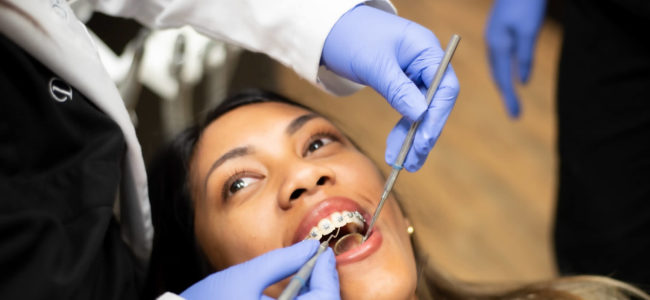Brushing your teeth with braces should be hard right? No, it’s really not. While it may require more time and care to clean than without braces, it’s easier than you think!
Traditional braces are by far the most common and recognizable treatment when it comes to fixing misaligned teeth. Since their invention, there have been a handful of changes and improvements, but their basic function hasn’t changed much. The idea is to apply constant, controlled pressure on specific teeth to gradually move them until they’re properly aligned. Invisalign uses the same concept, but without the use of wires or metal brackets. Both options are not only beneficial for the appearance of your teeth, but they can also improve their functionality and reduce the risk of fractures and wear which occur over time. Braces and Invisalign are essentially different tools for improving the overall position of your teeth. As with any tool, it’s important to take proper care of them for the best results.
Foods to Avoid with Braces
When wearing braces, the foods you eat are especially important. The same foods that damage and discolor your teeth can easily become stuck between braces and your teeth. In general, crunchy foods such as hard candy, pretzels, nuts, carrots, and other sufficiently hard foods could bend the wires, loosen the bands, or possibly break the brackets. Sticky and chewy foods like caramel and chewing gum can easily get stuck in the wires and may also cause damage to your teeth and/or gums. Most chewy and sticky foods make it more difficult to clean your teeth in general and should be kept to a minimum.
How to Clean Your Invisalign Trays
With Invisalign, you should take care of your teeth as you would normally would with your aligner tray removed, but you should also be sure to clean the aligner itself regularly. Many people make a habit of rinsing and brushing their trays while brushing their teeth. Remember to avoid hot water when you do this. Simply rinsing in cold water is the best way to clean out excess saliva and bacteria. When brushing, avoid the kinds of toothpaste with abrasive chemicals.
How to Brush Your Teeth With Braces
Brushing and flossing are essential for maintaining healthy teeth under normal circumstances, but while you have braces, you have to be diligent every day. Ideally, you should brush after each meal. Use a gentle, circular scrubbing motion over the surface of your entire set of teeth, being sure to cover the front, back, and bottom of each tooth. Though a regular toothbrush will work fine, electric and sonic toothbrushes work better for cleaning the areas around your braces thoroughly. Interdental brushes are also ideal for reaching around your braces easily.
Flossing With Braces
Flossing with braces can seem tedious, but it’s essential for your overall oral health. You have to be more purposeful when flossing with braces, but it’s not too difficult. Just start with threading the floss between the main wire and your tooth. Then, get rid of as much debris as you can see by sliding the floss back and forth gently. Don’t forget to double-check the space between your braces and your gums. Once your teeth feel debris-free, gently unthread the floss as not to displace any of the wires attached to the brackets. You should always avoid foods that can harm your teeth, but with braces, you should take extra care in avoiding foods that require flossing after eating to avoid any costly or painful accidents.
The Importance of Keeping Braces Clean
Above all, keeping your braces clean and well maintained is the best way of ensuring that they’ll work. It’s important to take special care when brushing and flossing, being sure to clean them thoroughly without putting too much strain on the bands and wires. It’s best to use a soft bristled toothbrush for getting between the braces and teeth to clear away debris. With floss, be sure to get underneath the archwires for thorough cleaning. A floss threader can be especially helpful for this. In addition, fluoride mouthwash is recommended for clearing away any debris that may have been left behind and keeping your gums healthy.
Getting routine cleanings from your dentist is also important. Normally, one to two cleanings a year is recommended but your dentist may recommend an extra cleaning if it would be more beneficial. Your orthodontist should also be the first contact when it comes to questions, complications, or any with issues that occur.
Stress-Free Orthodontic Services
At Ideal Dental, we believe that visiting the dentist should be a pleasant and stress-free experience. We offer comprehensive dental services including orthodontics to ensure you have everything you need to maintain a healthy and beautiful smile. Feel free to contact us with any questions regarding how braces work or any other dental concerns.
